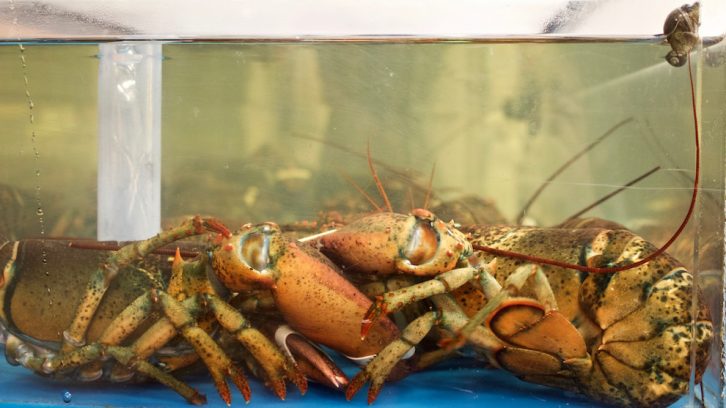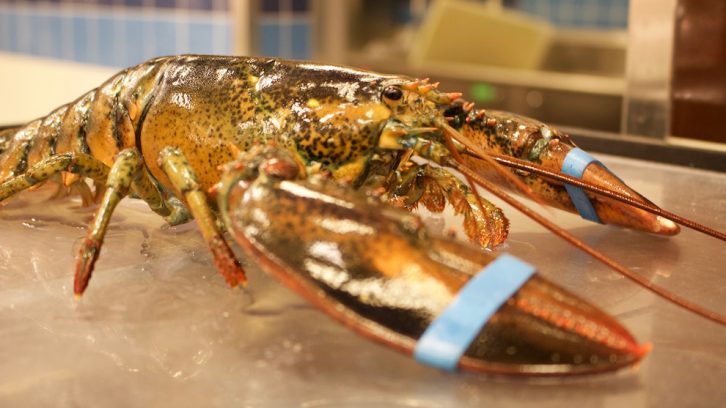Nova Scotia lobster industry facing uncertain future amid coronavirus flight suspensions
Local industry on edge over recent suspension of all direct cargo flights to China

caption
A cargo plane being loaded at the Halifax Stanfield Airport.After years of growth, lobster exports to China from Nova Scotia have slowed to a crawl following the recent coronavirus outbreak.
This is sparking fear in Nova Scotia’s lobster fishing community.
“This is unprecedented. We are in uncharted waters,” said Bruce Gidney, vice-president of Digby-based Gidney Fisheries Limited.
Early last week, Halifax Stanfield International Airport received news that Skylease, one of their air cargo carriers, was suspending all direct flights to China. Related stories
Leah Batstone, spokesperson for the Halifax airport, said this means two to three weekly cargo flights, typically carrying seafood and going directly from Halifax to the Chinese market, will not be happening.
Skylease told the airport that flights will likely be impacted for the next couple of weeks.
The biggest export on these direct flights is live lobster.
Excess product
China is a huge market for Nova Scotia’s live lobster exports, and without the cargo flights, the lobster industry across the province are worried about moving their product.
“You can only hold lobsters for so long and then they start dying on you,” said Gidney.
He said since the coronavirus, their sales have gone down by 80 per cent.
“We’re still sitting on inventory from a month or so ago and just hoping to sell it,” said Gidney. “You get to a point where you have so much inventory you have to move some of it. If China’s not going to buy it, you have to dump it somewhere else.”

caption
Muise said live lobster, as pictured in this 2016 file photo, has to reach it’s export market within 36 hours after harvest to ensure freshness.Leo Muise, executive director of the Nova Scotia Seafood Alliance, said because the demand is so low and the supply is so high, prices are plummeting.
“The price paid at the wharf when this all started was in the area of $10, and as I understand it, it’s about $7 today,” said Muise.
This drop affects everyone involved in the seafood business, as it is a very interconnected industry.
“There’s been a lot of people handling it from the time the final end customer gets it,” said Muise. “It’s very, very complicated.”
Growing, growing, gone
According to the latest export data released by Statistics Canada, lobster exports to China from Nova Scotia increased from $159 million in 2017 to $439 million in 2019.
The United States was previously Nova Scotia’s biggest market for lobster exports, but China surpassed the U.S. by $111 million in 2019 .
Muise said the U.S. and China are very close to being equal when it comes to lobster exports.
He estimates that out of the total exports, roughly 45 per cent of it goes to the U.S., 45 per cent of it goes to China and 10 per cent of it goes elsewhere.
He said this increase in lobster exports has been slow, steady, and meticulous over time.
Muise said it used to be only one flight a week, but over the last few years this has slowly increased to anywhere from two or three to six or seven during the busy seasons.
This increase prompted an expansion to the Air Cargo Logistics Park at the Halifax Stanfield International Airport, a project set to be completed by early 2021.
An Aug. 20, 2019 news release from the airport said “the global appetite for Atlantic Canadian goods shows no sign of slowing down.”
Now, only six months after this news release, this global export has slowed to a near halt as a result of flight suspensions.
Muise said the coronavirus outbreak “was almost like a tap and turning off the water. It stopped, and it stopped very quickly.”

caption
A live lobster, from a 2016 file photo, ready for sale.Increasing uncertainty
Muise said right now it is a “huge unknown,” and there is a lot of uncertainty within the industry.
“I think this is an unusual happening, and an unusual incident,” said Muise. “I guess the big thing is to remain calm and we’ll see where it turns.”
Muise is hopeful the virus will be contained and things will return to normal.
“The question is will that happen next week, next month, or when? We don’t know,” he said.
Gidney agrees the worst part is the uncertainty.
“Everybody gets nervous and they start selling what they shouldn’t be selling cheap and taking losses,” he said. “Everyone is taking losses, and this industry has already had enough losses over the years.”
Right now, there is no clear answer regarding when cargo flights will start again or when the virus will be under control.
“Everybody is just waiting to see what happens,” said Gidney.
About the author

Ellen Riopelle
Ellen is a journalist currently living in Halifax. She has a penchant for travelling, hammocks, craft beer and good stories.
M
Martin Mendez